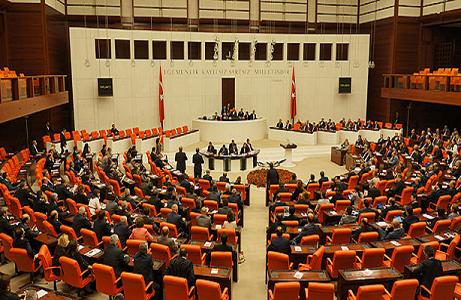Parliament extends the government’s authority for military action against Syria for one year amid debate between the opposition and the ruling party.
 Parliament renewed Oct. 3 the government’s authorization to send troops into Syria after a tense session in which the opposition parties fiercely criticized the ruling party’s interventionist foreign policy and tolerance for the appearance of al-Qaeda-linked groups on Turkey’s border.
Parliament renewed Oct. 3 the government’s authorization to send troops into Syria after a tense session in which the opposition parties fiercely criticized the ruling party’s interventionist foreign policy and tolerance for the appearance of al-Qaeda-linked groups on Turkey’s border.
The ruling Justice and Development Party (AKP) and the Nationalist Movement Party (MHP) voted in favor of the motion, while the Republican People’s Party (CHP) and the Peace and Democracy Party (BDP) voted against the motion.
“What we want is not war but to stop ongoing war,” Defense Minister İsmet Yılmaz said in his address to Parliament before the vote. “All sorts of precautions for the security of our country and people are being taken within the frame of new rules of engagement and in the face security risks posed from Syria.”
Recalling that Turkish jets downed a Syrian helicopter that violated Turkish airspace on Sept. 16, Yılmaz said Turkey would not hesitate to use its rights flowing from international law if such violations re-occur.
The Turkish Parliament had authorized the government to stage cross-border actions against Syria last year after a Turkish reconnaissance jet was downed by Syrian security forces on June 22 and after a number of Turkish citizens were killed by bullets and shells coming from across the Syrian border.
The motion was extended primarily because of Damascus’ alleged use of chemical weapons on Aug. 21 in an attack that killed more than 1,400 civilians, the potential influx of Syrian refugees into Turkey and the killings of at least 71 Turkish citizens so far due to unrest in the Arab republic.
Turkey currently hosts nearly half a million Syrian refugees on its soil.
“The fact that the Syrian government resorts to substances banned by the international law constitutes a major threat to its neighbors, especially Turkey,” read the motion.
Although the MHP endorsed the motion, it strongly criticized the government over its Syria policy. “The government is a victim of its own ideological ambition because of its over-engagement in the Syrian civil war. The AKP’s foreign policy is gradually becoming isolated. What kind of diplomatic brilliance is [Foreign Minister Ahmet] Davutoğlu trying to pull off by allowing two savage terrorist groups to share our border?” Tuğrul Türkeş, an MHP lawmaker, said in his address to the Parliament in reference to al-Qaeda and groups linked to the outlawed Kurdistan Workers’ Party (PKK).
The CHP lashed out at the government’s foreign policy, decrying what it termed “a motion for war.”
“This situation is a result of the AKP’s decision to ignore any lessons they could learn,” Faruk Loğoğlu, the deputy CHP leader, said in his address.
Underlining that the CHP would stand against the AKP’s warmongering policies, Loğoğlu said: “The AKP, wishing to continue its adventurous and irresponsible Syria policy, has brought our country to the brink of disaster. While the CHP asks for ‘peace and diplomacy,’ the AKP calls for ‘war and more military intervention.’ We have become neighbors with the world’s most dangerous terrorist groups.”
Totally isolated in its own region, the Turkish government’s only friends are Hamas and the Muslim Brotherhood, he added.
The BDP rejected the motion in a similar tone. “The government’s policy toward the Middle East and in particular Syria has fully collapsed,” said İdris Baluken, the deputy parliamentary group leader of the BDP.
Highlighting the attacks carried out by al-Qaeda-affiliated Islamist groups against Kurds in northern Syria, Baluken said the government was actually protecting the groups. “The AKP government which could not protect the lives of its citizens in Reyhanlı, Öncüpınar and Akçakale, is successfully protecting al-Qaeda and al-Nusra,” he said, adding that they would never accept the pressure and attacks against the Kurds in Syria.
Responding to the opposition’s criticisms against the government’s reluctance in calling the al-Nusra Front a terrorist organization, Yılmaz said: “Whether its name is the PKK or al-Qaeda, those who kill civilians are all terror organizations. We do not distinguish from the other. We have never been on the side of [Syrian President] Bashar al-Assad.”
“You cannot get away from [this situation] by just calling al-Nusra and al-Qaeda terrorists. You should also cut your support for those groups,” Baluken said in response.















